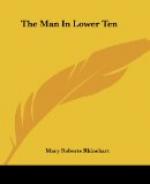The trip west was without incident. I played bridge with a furniture dealer from Grand Rapids, a sales agent for a Pittsburg iron firm and a young professor from an eastern college. I won three rubbers out of four, finished what cigarettes McKnight had left me, and went to bed at one o’clock. It was growing cooler, and the rain had ceased. Once, toward morning, I wakened with a start, for no apparent reason, and sat bolt upright. I had an uneasy feeling that some one had been looking at me, the same sensation I had experienced earlier in the evening at the window. But I could feel the bag with the notes, between me and the window, and with my arm thrown over it for security, I lapsed again into slumber. Later, when I tried to piece together the fragments of that journey, I remembered that my coat, which had been folded and placed beyond my restless tossing, had been rescued in the morning from a heterogeneous jumble of blankets, evening papers and cravat, had been shaken out with profanity and donned with wrath. At the time, nothing occurred to me but the necessity of writing to the Pullman Company and asking them if they ever traveled in their own cars. I even formulated some of the letter.
“If they are built to scale, why not take a man of ordinary stature as your unit?” I wrote mentally. “I can not fold together like the traveling cup with which I drink your abominable water.”
I was more cheerful after I had had a cup of coffee in the Union Station. It was too early to attend to business, and I lounged in the restaurant and hid behind the morning papers. As I had expected, they had got hold of my visit and its object. On the first page was a staring announcement that the forged papers in the Bronson case had been brought to Pittsburg. Underneath, a telegram from Washington stated that Lawrence Blakeley, of Blakeley and McKnight, had left for Pittsburg the night before, and that, owing to the approaching trial of the Bronson case and the illness of John Gilmore, the Pittsburg millionaire, who was the chief witness for the prosecution, it was supposed that the visit was intimately concerned with the trial.
I looked around apprehensively. There were no reporters yet in sight, and thankful to have escaped notice I paid for my breakfast and left. At the cab-stand I chose the least dilapidated hansom I could find, and giving the driver the address of the Gilmore residence, in the East end, I got in.
I was just in time. As the cab turned and rolled off, a slim young man in a straw hat separated himself from a little group of men and hurried toward us.
“Hey! Wait a minute there!” he called, breaking into a trot.
But the cabby did not hear, or perhaps did not care to. We jogged comfortably along, to my relief, leaving the young man far behind. I avoid reporters on principle, having learned long ago that I am an easy mark for a clever interviewer.




